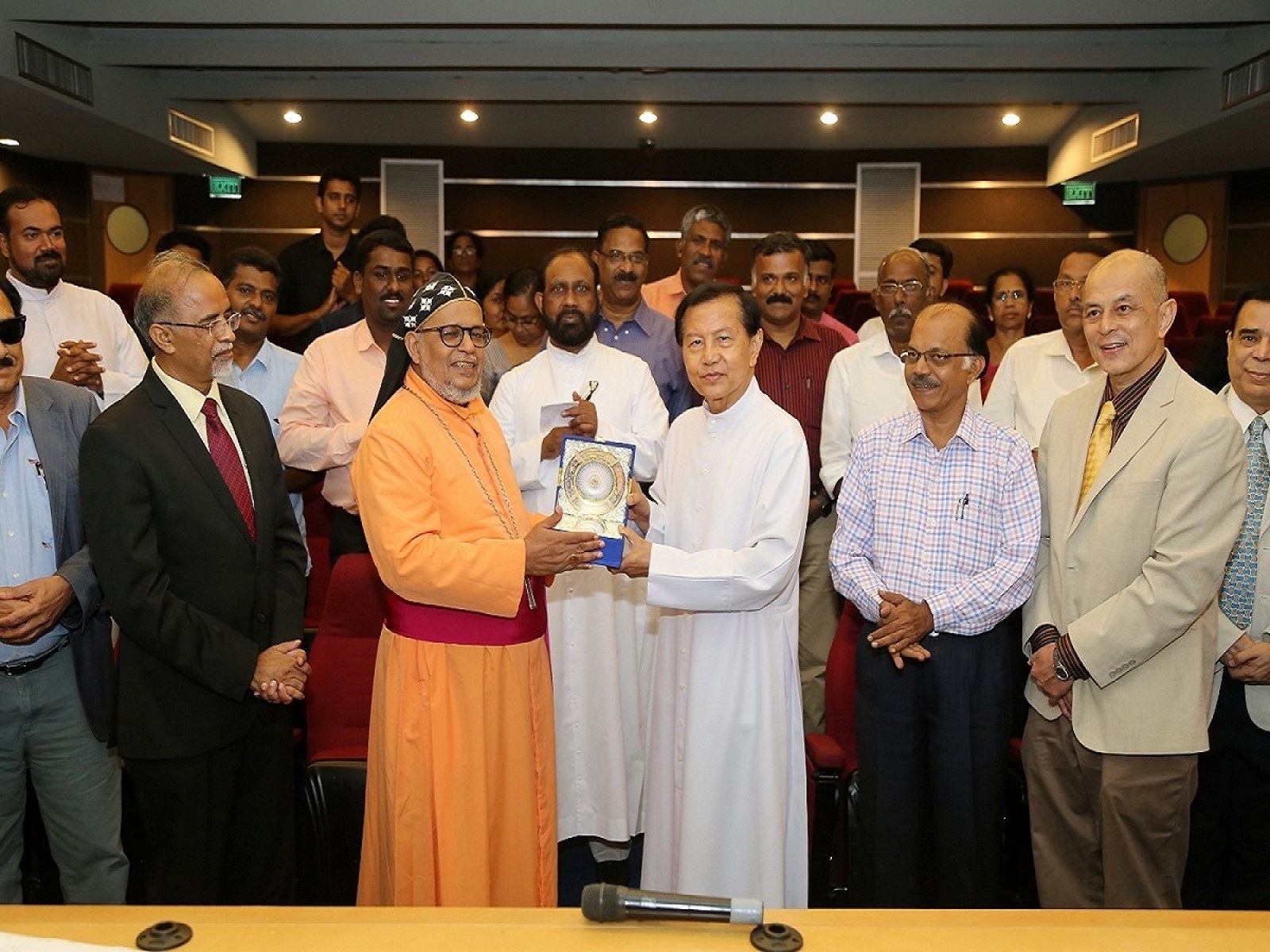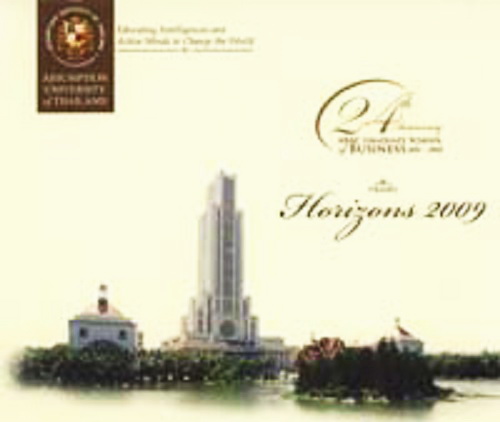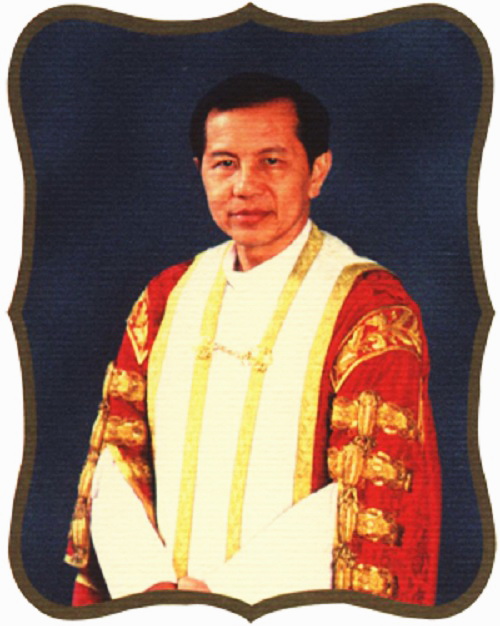Welcome Message
Rev. Bro. Bancha Saenghiran, f.s.g., Ph.D.
President, Assumption University
President of the PDK (Thailand Chapter)
Participants
Honored Guests
Ladies and Gentlemen:
May I first welcome all of you to Assumption University (Suvarnabhumi Campus) in general and to this conference in particular.
I want also to congratulate the Phi Delta Kappa (Thailand Chapter) on its 25th anniversary, being celebrated this year. Truly this organization has initiated great improvement in Thai educational circles and continues to make greater strides of achievement possible for Thai scholars. The organization has been instrumental in improving the opportunities available in Thailand for learning and furtherance of educational opportunity within the Thai context. As a member of an international organization, the Phi Delta Kappa (Thailand Chapter) is also instrumental in continuing and updating the critical linkages between Thai educators and international scholars from a variety of other countries.
In the current situation, with advancement in the domestic arena being so interdependent with learning and skills acquired all over the globe, these linkages assume ever greater importance. By ensuring and furthering the continuation of such linkages, Phi Delta Kappa (Thailand Chapter) plays a critical role in the furtherance of learning of the Thai people. I wish to congratulate and commend the organization on both its twenty-five years of service and its continuing support of Thai scholars.
The topic of this conference is very timely. It deals with ethics and the use of technology in the postmodern era of education. May I draw your attention to three key words, namely, ethics, technology, and postmodern era.
Postmodern Era is the period designated by philosophers, social scientists, and social critics to refer to aspects of contemporary culture, economics and society that are the result of the unique features of late 20th century and early 21st century life. In general, post modernity is the response to society which has evolved from modernity.
Historically, post modernity has been said to have gone through two relatively distinct phases:
(i) The first phase began in the 1950s and overlaps the end of modernity. In this period there was the rise of television as the primary news source, the decreasing importance of manufacturing in the economies of Western Europe and the United States. The era was marked by the emergence of pop cultural styles of music and drama, including rock music.
(ii) The second phase of post modernity is visible by the increasing power of personal and digital means of communication, including fax machines, modems, cable, and eventually high speed internet. This led to the creation of a new economy.
The ability to manipulate items of popular culture, the world wide web, the use of search engines to index knowledge, and telecommunications were producing a convergence which would be marked by the rise of “participatory culture” and the use of media appliances, such as Apple’s iPod
Ethics is a major branch of philosophy, encompassing right content and good life. It’s significantly broader than the common concept of analyzing right and wrong. Many philosophers believe that morality consists of following precisely defined rules of conduct. Plato emphasized four virtues in particular, namely: wisdom, courage, temperance and justice (which were later called cardinal virtues). Other important virtues are fortitude, generosity, self-respect, good temper, and sincerity.
In moral education, we normally stress the importance of developing good habits of character. A central aspect of ethics is “the good life”, the life worth living or life that is simply satisfying which is more important than moral conduct. The truly wise man will know what is right, do what is good and therefore be happy.
Technology. At present, we talk about emerging technologies, like, electric cars, biofuels, artificial intelligence, genetic engineering, anti-aging drugs, wireless communication, nanomaterials, machine translation, to mention just a few. What is of special interest at this conference is the use of the internet. Internet is a network of almost all the computers in the world. You can browse through much more information than you could do in a library. That is because computers can store enormous amounts of information. You also have very fast and convenient access to information. Through email you can communicate with a person thousand of miles away in seconds. There is chat software that enables one to chat with another person on a real-time basis. Video conferencing tools are becoming readily available to the common man. Computers have leapfrogged the human society into another league. It is used in each and every aspect of human life. This revolutionary technology can be indeed either a boon or a bane to the human race depending on the users.
The topic of this conference, involving as it does both the ethical and technological aspects of our current educational environment, gets to the heart of one of the critical challenges of our time. This challenge is how to ensure that our students get the best value and learning experience by using technology while at the same time protecting these selfsame students from the wide ranging and disparate abuses of such technology. It is of this challenge that I now wish to speak. In our globalized current situation the internet and all of its applications from commerce and trade to local and international business, sports, entertainment, investment and even criminal activity of every description, is inescapable. It is not possible nor is it desirable for us to close our eyes to this development, which encompasses every aspect of modern life from the most private to the most public of contexts.
It is imperative, however, that as we embrace the new technologies and work to further the opportunities we can and will create for our students in using them, we remain cognizant of both their limits and their inherent dangers. We know that with these technologies it is now possible, as one example, through research databases, to have at our fingertips vast resources of journals on education, medicine, technological change, industry and spiritual knowledge with only a few strokes of the keyboard. Space conscious institutions like Assumption University may have literally a million or more volumes filled with the latest ideas available in an instant where in the past possibly days or weeks may have been spent searching through stacks in a library to locate information, and even then it would be time bound in a way that research database information is not. Further, by using e-mail and messaging technologies, it is now a simple matter to interact with researchers all over the world who may be engaged in similar projects to our own scholars so that ideas may be compared. We thus have a true synergistic platform available for our usage.
But, as I alluded to earlier, all of these benefits and wondrous advantages, which are clearly very substantial, do not come without possible limitations and costs. While our students can and will use this medium to stay current with rapidly changing knowledge in every field of endeavor, they can also use it to access the latest in pornographic material; the students may use it to hurt other students; some may use it to bully their peers. In the context of public and private education at the elementary, middle and high school levels, it can have and unfortunately will probably continue to be used to instigate violence, even murder, against students and other members of society. Though the internet and modern technology have tremendous potential for the growth and learning of our students worldwide, it is a medium which has inherent limitations and may be subject to tremendous abuse in certain situations.
We, as educators, have both an opportunity and a responsibility, and it is imperative that while enjoying the former, we do not abdicate the latter. Our opportunity is to take the tremendous potential of these new technologies and use them to provide the best in updated learning methodologies for our students; to take this new knowledge and interact with other scholars all over the globe as we work together to find new ways to advance knowledge; to work with students having needs beyond to scope of a normal classroom and find ways to use these technologies to enhance and improve their learning; to serve those in locations not traditionally served by learning institutions, such as jails, remote farming communities or poorer areas; to take the potential of these new technologies and find ways to make them serve the ever changing needs of our students.
Our responsibility is to teach our students about the role of ethics in technology. We need to ensure that our students understand that there is information on the internet that can hurt them if improperly used. Our students need to know that there is unreliable information our there and they need ways of recognizing and identifying such information. Our students need to learn that responsible recreational use of the computer is perfectly acceptable, but that there is a time and a place for such use. They need to be taught where the lines blur and internet use may become internet addiction. Students need ways of identifying the attributes of such addiction in themselves and their peers. They need ways of identifying those who may use the internet to take advantage of them and to know that they have reliable and trustworthy teachers to who they may turn to if something is amiss.
Internet use with the proper supervision is a fabulous opportunity for students which we clearly need to make available and pursue in all of its exigencies. Irresponsible supervision of the use of internet can be destructive to both the psychological and moral fiber of our society, as well as being a physical danger in certain situations.
But we need to go beyond mere supervision into teaching our students to become responsible users of this medium. If we take a typical teenager with limited self-control and maturity who is left to merely follow his or her whims in the use of these technologies, it is clear that there is danger lurking very close by. If the goal is only to have the pleasures available in the 21st century, to enjoy the sensory or visceral pleasures that these technologies may offer, while not taking cognizance of the wider goal or responsibility evident and inherent in their usage, then these technologies can become a double edged sword. The double edged sword, as we know, cuts in the direction we want, and provides us with advantage, but at the same time its opposite blade may cut against us, hurting us. This may happen with these technologies with the teenager referred to above, if not provided with the proper guidance, and, where merited, supervision.
The teenager merely surfs the internet at will, letting what images he or she may come across enter into his or her consciousness, taking these images to be proper representations of society and her or his role in it. Such was the case with the recent tragedy of a teenager brutally savaging and murdering a Bangkok taxi driver after having played the online version of a game in which one of the objectives was ‘carjacking’ or murdering the driver of a car and stealing money and/or the vehicle and its contents. When young people are subjected to these images over and over again without a reflective adult voice to provide guidance, they may begin to make assumptions about what is normal and acceptable in society which have little to do with any real or responsible context. This can lead to irresponsibility, social decay, violence, abusive behaviors and an uncaring, jaded populace.
Our task as educators is to ensure that these technologies are a service and not a detriment to our students and the wider society of which we are all a part. We need to work to ensure that love, integrity and moral purpose form the core of our interaction with our students in the use of these technologies.
We must not shrink from our responsibility in recognizing and alerting our students to the limitations and dangers of these developing technologies. Part of the mission of the Phi Delta Kappa (Thailand Chapter) is to support the development of education for teachers and others in Thai society. In the current environment, this means, in part, developing a concern for and skill in using internet and communications technology in a responsible manner. Students need to learn the manner in which they may use the tools available to them responsibly to facilitate change and improvement in our society. We need to be aware of the National Act on the Use of the Internet which lays out procedures for education including that no pornographic material is to be accessed; the internet is not to be used to lead people astray, for forgery or other illegal activity.
If people are aware of the negative effects of say, an ingredient such as melamine, to use a recent example, then they are much less likely to consume it. The same is true for the internet. I don’t want people to have the impression that I am being alarmist with any of these remarks. This is not the intent: It is simply the case that when we are aware of the limitations and dangers inherent in a situation we are much more likely to take steps to avoid it or to minimize the risks if we should become involved. The same is true for the internet: awareness of the risks and limitations may often be curative in and of itself.
The goal, then, of this conference is to shed light on the unknown, to be a source of light, to prepare the way for our educators, so that in knowing we may be responsible in our actions and interactions with students and the wider community. We can’t just bar our students from using this medium. We must teach our students to use the medium with moral maturity. We need to explain the limits and opportunities, the benefits and the perils, the building opportunity and destructive potential dangers. If educators can guide students in the right way, then these students can step forward, can embrace the opportunity presented with these new and emerging technologies, can bring themselves up to par with development and the needed concern for ethics which is so much a part of all that we do, in education and in life.
My final wish for this conference, with which I would like to leave you this morning, is that it be a great success. I wish that the papers presented at this conference together with the discussion may shed light on our current procedures, and that new findings in methods for education and innovations become a hallmark both of this conference and in the time that follows these proceedings. It is my conviction that further deliberations both here in Thailand and elsewhere will result from and be informed by our efforts here.













